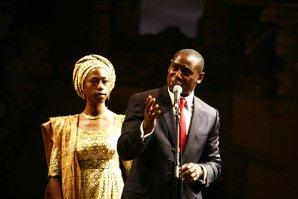Welcome to Thebes
Mythology is entwined in the politics of a war-torn African state in this world première of a new play by Moira Buffini. Though it's set in a city called Thebes sometime in the 21st century, the main characters all have names from Greek mythology which also provides elements of the plot. Ms Buffini seems to have an enduring interest in Greek legends which she has sought to incorporate in the play. However, though the piece provides a vision of the chaos, despair and barbarity of civil war and the difficulties involved in post-conflict reconstruction, the addition of mythology into an already complex scenario clouds rather than illuminates the issues.
'Conflict devastated' Thebes has been ravaged by years of barbaric civil war. At the beginning of the play we meet three soldiers - one of whom is a child - who forcibly declare that the only politics in Thebes is the gun. In fact, democratic elections have recently been held and the new President, Eurydice, hopes that she can set her country back on the road to normality. She's appointed mostly women to her cabinet and anticipates that a visit by Theseus, the first citizen of the powerful state of Athens, will lead to a deal that will help her and the cabinet rebuild the country. But it's not all plain sailing, as the opposition politicians led by Prince Tydeus, are hungry to take the reigns of power for themselves. And there is much unfinished business from the war which muddies the political waters and distracts attention from the urgent need to provide the war-weary citizens of the country with basic necessities.
Richard Eyre's ambitious production boasts a large cast, an impressive set and some fine music. The backdrop for the entire play is an iconic presidential palace, now in ruins. Designer Tim Hatley has incorporated convoluted, interlocking arches in the palace design which contrasts the vast misspent wealth embodied in the palace with the overwhelming devastation and poverty of the country.
Though I think there's rather a surfeit of characters, there's much to commend in the acting department. Nikki Amuka-Bird is the new president, Eurydice, who finds that good intentions alone do not ensure secure political success. David Harewood is the seemingly assured and condescending Theseus who has to cope with his own demons in the form of his family. And Chuk Iwuji is the violently flamboyant Prince Tydeus who is hell-bent on stirring-up trouble and obtaining power for himself.
I'm not sure that the marriage between mythology and the politics of a post-conflict African state works or was even necessary in the first place. In one sense, of course, the mythological aspect of the play merely provides a framework for the plot, if you like it's just part of the story. But it also imposes an artificial quality which detracts from the central issues which face a country trying to recover from civil war. There's also a strong sense of inevitability underlying 'Welcome To Thebes' as though the fate of the country has been predetermined and, therefore, sealed. This invokes a feeling of hopelessness, which may well have been Buffini's intention, but it's nevertheless rather depressing.
"Much as I love the scope and ambition of Buffini's play, there runs through it an unresolved contradiction between free will and fate...Buffini's play is thoughtful and provocative"
Michael Billington for The Guardian
"An admirably ambitious, fascinating (if uneven) piece, premiered in a vivid, expertly marshalled production by Richard Eyre which is alive to the urgency of the play's politics and to its engaging streak of iconoclastic humour."
Paul Taylor for The Independent
"The drama has no true centre and, although the story is impressive in scale, the writing is bumpy"
Henry Hitchings for The Evening Standard
"There is no point in pretending this is an easy evening. It combines the torment and tension of classical Greek tragedy with an all too recognisable account of the bloodshed of modern Africa...Yet there is also wit and black humour on offer here."
Charles Spencer for The Daily Telegraph
External links to full reviews from popular press
Guardian - Independent - Telegraph
Originally published on
